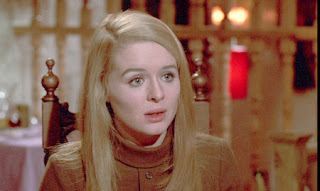Directed by Val Guest; produced by Frank Bevis
Little Erik Jenner (Jon Whitely), playing with his friends amid an
old bomb-site in London, finds a pistol in the debris. A scuffle ensues among
the boys over possession of the prize and the pistol, still loaded, goes off,
seriously injuring a child. Erik, terrified of being in trouble for the
incident, runs away. Though he tries to return home to his anxious mother, Elsa
(Lizabeth Scott), he is scared off by the presence of police, and is then
pursued across the Metropolis by American army investigator Mark Andrews (Steve
Cochrane), as well as the gun’s original owner (George Cole), intent on keeping
his ownership secret.
The Weapon is an adequate suspense movie that
gives the impression that it could have been much better. Though its 77-minute
running time should have given plenty of opportunity for the story to tell
more, most of it is spent in dead-end character development and scenic sequences
of Erik roaming London.
At fault, I think, is the writing. The story seems half-made. We
are told that the pistol was used in a murder from ten years before (the police
are initially led to suspect a connection because both the bullet that strikes
the little boy, and that used in the homicide, were of the unusual .27
calibre), but learn almost nothing about that crime. We meet an acquaintance
(Nicole Maurey) of the earlier victim, but her involvement isn’t really
relevant. Motive, victim, suspects: none of those is elaborated upon.
Indeed, Andrews’s half-hearted renewal of the investigation into
that old case is without an object, especially since the police detective
(Herbert Marshall) who headed the earlier inquiry is fully involved in the hunt
for Erik. Andrews himself is an annoying character, rather unpleasant, though
he is seen to change through the film. This change, however, isn’t realistic,
given the events, and when we are provided clues as to why he is the way he is,
they are not explained or followed up.
The screenplay creates a minor problem in the finding of the
pistol. It is discovered embedded in a brick (or some other building block) of
a ruined structure. This means that it had to have been hidden there when the
structure was raised, even though that structure had to have been destroyed in
the war (it’s called ‘the bomb-site’); at the latest, 1945. Yet the murder the
gun caused is ten years old in the movie’s present, which is not indicated to
be anything other than 1956. This problem could have been avoided by having the
gun simply buried under rubble.
Aside from this small quibble, the story-line seems undecided on
what it wants to do, or where it wants to go. It would have been preferable to
avoid the American angle and have it written in the semi-documentary style that
British films mastered in the late 1940s and early ‘50s. A police hunt for
Erik, led by Marshall’s character, who might suspect that the original murderer
is also searching for the boy, would have made for more suspense, and a tighter
film.
In The Weapon’s favour is the direction, which makes good use of London locations, and the acting, from a range of performances of different styles, nationalities and ages. Neither of these qualities, however, make up for the lackluster script, and the poor results of its use.





































